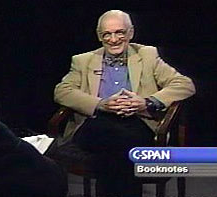In Honor of Bernard A. Weisberger: The Bernie Principle

I hadn’t yet reduced myself to pleading with Bernie, but it was close. These were the final moments of the 2000 presidential election, and my email exchange with him began to resemble the overheated pamphleteering days of old.
Late into the night our words and warnings and jeremiads would spin off the virtual printing press, each trying to persuade the other.
Don’t let the perfect be the enemy of the good, I implored with the faint hope that Bernie might abandon his principled vote for Nader in favor of Gore, fearful that Bush would become the most conservative and dangerous president in our lifetime.
But to Bernie, the Democratic Party needed a wake-up call. It had abandoned those “mystic chords of progressive memory,” as he put it, and sacrificed working Americans in favor of corporate give-aways and campaign contributions. What were once the guiding ideals of the party, he wrote, “have barely been kept alive even in attenuated form.”
So Bernie and I agreed to trade votes. I cast a Nader ballot in safe Maryland, and Bernie checked Gore in what was then a still uncertain Illinois. We each got the other to vote for our guy – with a wink and a smile.
It was quintessential Bernie. Disagreement need not be disagreeable, and political passion among colleagues and friends is all about respect, love, and even a little joy.
And woven into every conversation is an abiding Bernie principle: American history is a sacred trust that we in the present need to respect.
So in many ways Bernie’s Nader push really wasn’t about the election after all. It was about an America bequeathed to us through generations of sweat, hardship, sacrifice, and the hardscrabble pursuit of the American Dream.
“We (you and I) do share something,” he wrote to me then, “to wit a wish for the regeneration of those progressive ideals that gave us the Square Deal, New Freedom, New Deal, Fair Deal and Great Society – loosely, the vision of a cooperative rather than a competitive society, with each of us having a stake in everyone else's welfare and communities using government as the agent of reining in greed and lifting up those on the bottom, recognizing individual differences and merit but making equality and justice rather than accumulation the first priorities of society.”
There’s a morality tale to the American story that Bernie tells, one of the powerless confronting power and innocence coping with guile. But true to Bernie, overriding all is a story of optimism and hope. A true belief in the American creed. A genuine conviction that ideals can prevail even with mighty forces amassed against them.
Bernie was my mentor at Vassar College, where he taught three of my courses and supervised my senior thesis. And looking back over these four decades I think my own buoyant view of the American experiment can be traced to those days in Swift Hall when Bernie delighted us with stories of American grit, perseverance, and resilience.
And stories he told. We learned of an America huddled in the Lower East Side, empowered in union halls, besieged by Red Scares, satirized by Mr. Dooley. It was America scheming in Tammany Hall and forbearing in the cotton fields, marching for temperance and fighting for suffrage.
But on this vast canvas he painted there was always a constant: that even amid hardship, injustice, and frustration, Americans always remain unbowed.
Perhaps that is why Bernie refused to compromise back in 2000. Because to him the American character should never run from hope.
In the America Bernie taught me, I honor the immigrant, the enslaved, the segregated, the working men and women, the muckraker, all fighting against the odds, all believing in the American promise.
And to that list I should add the historian, my mentor and friend, Bernie Weisberger.